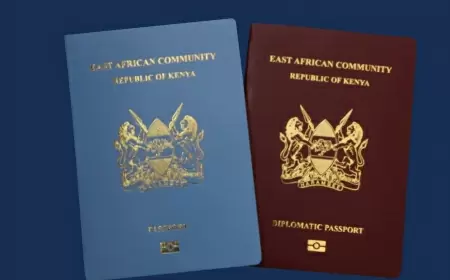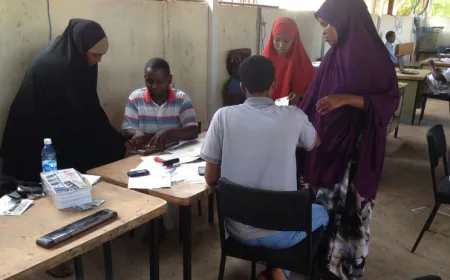Types of Non-profit Organizations in Kenya
In Kenya, there are several registration types available for non-profit organizations. Understanding these options is important for individuals and groups interested in establishing such organizations. By registering your non-profit organization, you gain legal recognition, which not only adds credibility but also provides access to various benefits and resources.
1. Non-Governmental Organizations (NGOs)

According to the Kenyan NGO Act, an "NGO" is defined as a non-profit organization that is comprised of individuals or associations who have come together on a national or international level. The purpose of these NGOs is to benefit the public and promote social causes.
The areas covered by welfare organizations, development initiatives, charities, or research include but are not limited to health, relief efforts, agriculture, education, industry, and the provision of amenities and services.
According to the NGO Act, it is considered an offense for any individual to operate an NGO in Kenya for purposes such as welfare, research, health relief, agriculture, education, industry, the supply of amenities, or any other similar purposes without proper registration as an NGO..
Being designated as a non-governmental organization (NGO) comes with its advantages, particularly in terms of tax benefits. However, it also means that you have to adhere to specific regulations that are important for determining equivalency. These regulations play a significant role in ensuring transparency and accountability within the NGO sector.
2. Companies Limited by Guarantee

Non-profit companies limited by guarantee are another option for registration in Kenya. In this structure, the company exists primarily for promoting a particular purpose rather than making profits for its members or shareholders.
Unlike private registered limited companies that have shareholders and share capital, companies limited by guarantee do not have any shareholders or share capital. Instead, they have members who act as guarantors, agreeing to contribute a predetermined amount of the assets of the company in the event of a liquidation.
One of the main features of companies limited by guarantee is that they are primarily established for non-profit purposes. These organizations typically operate in areas such as education, arts and culture, social services, and other charitable activities. Their primary goal is to serve the public or a specific community rather than generating profits for their members.
3. Trusts

A trust is a legal entity that is created to hold and manage assets for the benefit of others. It is established by a person, known as the settlor, who transfers their assets to the trust. The trustee, who can be an individual or a corporate entity, is responsible for managing and administering these assets according to the terms and conditions outlined in the trust document.
In simple terms, a trust is essentially a legal relationship that exists between a settlor (the creator of the trust), a trustee (the protector of the trust), and a beneficiary. These parties can be either individuals or corporate legal entities. In a Trust arrangement, the Settlor transfers legal ownership of assets to the Trustee, who holds them for the benefit of the Beneficiaries.
Trusts are established through a written document, which can be either a settlement document or a declaration of trust or trust deed. This document outlines the responsibilities and authority of the trustee.
Forms of Registration of a Trust in Kenya
There are two forms of registration for a trust, including the following:-
- Unincorporated Trust / Simple Trust : The registration process of the Trust deed, as per CAP 285, establishes it as an unincorporated Trust without any distinct legal personality of its own.When it comes to an unincorporated trust, it's important to understand that the trust itself is unable to own property, enter into contracts, or carry out any actions in its own name. Instead, these activities are conducted in the name of the trustees who represent the trust. This distinction is crucial for legal and administrative purposes related to the functioning of the trust.
- Incorporated Trust : To establish a trust as a body corporate, the trustees need to complete a trust deed, which must then be submitted to the Cabinet Secretary for Lands. Along with the deed, there are specific registration forms that need to be included. However, it's important to note that the registration process can be quite expensive and time-consuming, typically ranging from 6 to 12 months.
- Once a Trust is established under the Trustees (Perpetual Succession) Act Chapter 164 of the Laws of Kenya, the trustees will then be recognized as a legal entity with their own corporate identity as stated in the certificate.
The primary purpose of a trust is to ensure that the assets are protected and utilized in accordance with the wishes of the settlor. This can include providing financial support for family members, managing investments, distributing funds for charitable purposes, or safeguarding assets for future generations.
It is important to consult with a legal professional or seek expert advice to determine the most suitable form of registration for a trust based on the specific circumstances and legal requirements in your jurisdiction.
4. Societies

A society registration allows a group of individuals with similar interests and objectives to come together formally as an organization. Societies often focus on social welfare, Charity, Political parties, churches cultural activities, sports activities, private members clubs or professional development.
The Registrar of Societies in Kenya is a department that operates under the Office of the Attorney General. Its primary responsibility is to handle the registration process for societies within the country.
Forms of Society Registrations in Kenya.
Registration of societies in Kenya can be granted in two main ways:
• Registered Society
• Registered Excemption Society
Each method results in the issuance of two different certificates.
- Registered Society: Upon submission of the necessary application documents and payment of the applicable fees, most societies are eligible to receive a Certificate of Registration. This certificate serves as official recognition for their compliance with the registration process.
- Exemption Registration : A certificate of Exemption refers to the special status enjoyed by certain societies, which means they are not subjected to stringent oversight by the Registrar of Societies. This includes being exempt from obligations such as filing annual tax returns, accounts audits, and other mandated documents that regular societies are required to submit.
Exempt societies are categorized as a range of charitable organizations and affiliate agencies, with specific examples including certain churches like the Catholic Church, Catholic convents, and monasteries. These entities are granted exemptions from certain obligations or taxes based on their nature and purpose.
It is important to exercise responsibility and not misuse this privilege. It can be revoked if there is evidence of the society engaging in contentious or unethical activities.
Examples of Society Formations in Kenya
There are various forms of society examples in Kenya that reflect the diverse cultural landscape of the country. Some common forms include
- Alumni : A society formed by a group of individuals who have either attended or graduated from schools, colleges, universities, or other institutions.
- Welfare : A society formed when a group of individuals come together with the objective of offering programs that provide assistance, including financial aid, to both its members and those who are unable to support themselves.
- Foundation : This society is established with the primary goal of serving charitable purposes. It depends on the contributions made by its members to sustain and fund its activities.
- Recreational Club : A social and recreational society is formed as an organized group of individuals who join together with the purpose of engaging in leisure activities. These societies provide various amenities and facilities, such as golf clubhouses, swimming pools, tennis clubhouses, and more. These facilities are specifically designed to cater to the members' needs and enhance their social interactions within the community.
- Religious : A society formed by a collection of individuals who come together due to shared or dedicated beliefs and practices within the realm of religion and spirituality.
- Professional Development : A society created when a group of individuals come together, all of whom possess the necessary competence and skills in a specific activity. This activity usually requires a certain level of education, training, competency standards, knowledge, and often the demonstration of credentials. Additionally, members must adhere to certain guidelines or codes associated with their profession or field.
Was this information helpful ?












































































































